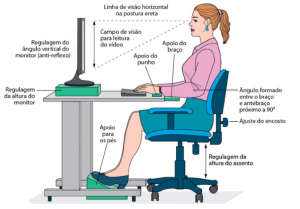Workplace Health
According to Article 284 of the Labour Code, the worker has the right to perform their duties under safe and healthy conditions. It is the employer’s responsibility to ensure these conditions and to follow general principles of prevention.
Occupational Safety and Health refers to a set of rules aimed at preventing professional risks and promoting and protecting workers’ health.
In administrative workplaces, there are certain risks worth highlighting:
- Musculoskeletal system: The most physically demanding working posture is standing. However, sitting for long periods also brings unfavorable conditions, such as injuries to the upper limbs (tendonitis, carpal tunnel syndrome, epicondylitis), lower limbs (bursitis, sprains), and the spine (neck pain, lower back pain, upper back pain, sciatica).
- Visual system: Staring at screens for long periods can cause conditions such as “computer vision syndrome,” leading to eye irritation, dryness, and visual fatigue.
- Mental health: Stress is one of the most common problems in the workplace and can lead to burnout or professional exhaustion — a state of physical, mental, and emotional fatigue caused by excessive and prolonged stress in a work environment.
To prevent these risks, IST recommends the adoption of the following measures:
- Proper placement of equipment: The monitor should be aligned with eye level, and both the keyboard and mouse should be aligned with the wrist line.
- High-quality office chairs: These should allow for seat height adjustment as well as backrest inclination.
- Perform short stretching exercises: to promote muscle relaxation.
- Take frequent breaks
- Manage workload effectively: It is crucial to delegate tasks appropriately and provide sufficient resources to complete the work.
- Procurar ajuda quando é necessário: o Técnico disponibiliza apoio psicológico nos seus Serviços de Saúde, bem como a Universidade de Lisboa. Todos os trabalhadores do IST podem também ter acesso a um psicólogo 24/7 através dos serviços da WPO.
